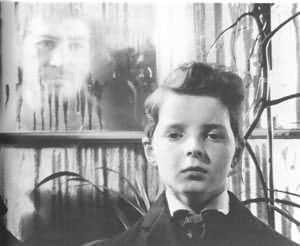I'm no expert on nineteenth century English literature, but I do know that it isn't exactly my favorite stuff to read. I was reminded of this while reading Henry James' novella The Aspern Papers, and let's say I had the opposite reaction of "I couldn't put it down!" I'm not sure if you can classify Henry James as an American writer or a British writer; he was born in the United States, but spent much of his life finding himself (or something) in Europe and settling in England. His writing sounds awfully British.
I always get Henry James' work confused with that of D.H. Lawrence, who in turn I sometimes confuse with James Joyce, who sometimes makes me think of Henry James. It's all one wicked confusing trifecta of classic literature. Funny I get them all confused, considering I haven't read much of their collective works, and considering that their writings aren't all that similar in terms of style. James Joyce (Irish guy, by the way) probably wins the contest for whose work stood the test of time best; Ulysses consistently tops the greatest-greats of English language literature, though I'm still waiting for that perfect moment when I know the time is right to read it. D. H. Lawrence (definitely British) seemed most happy with wicked romance; with titles like Women in Love and Sons and Lovers, how can one resist? Especially when the titles are much more literal than one would think at first. Thanks to D. H. Lawrence we have Lady Chatterley's Lover, and to Henry James we have The Portrait of a Lady, and to James Joyce we have A Portrait of the Artist as a Young Man. These guys' have had some of their books banned for the usual non-reasons (Lady Chatterley's Lover.... too indecent! Ulysses.... obscene! Portrait of a Lady.... that hussy!), but sauciness in literature then involves some rather close reading now to really see the connection. James' writing peak came in the 1880's whereas Lawrence and Joyce hit it in the 1910's and 1920's.... they were all alive and writing at the same point at some time, though. I'm wondering if these guys checked with each other before naming their books, or if anyone else for that matter is slightly confused with all that similarity. As is a favorite saying of one of my former writing workshops, Maybe it's just me. In every edition I've ever seen (which totals probably only 3), The Aspern Papers is always paired with James' more famous novella The Turn of the Screw. I'm not sure why they're packaged together, mostly because they're not exactly similar; Aspern is kind of a dull comedy and Screw is a creepy ghost story. My first exposure to The Turn of the Screw came as The Innocents (1961), its film adaptation, and is perhaps one of the best gothic horror movies ever made. Filmed in beautiful black and white, co-adapted for the screen by Truman Capote (?!), and starring Deborah Kerr as a governess about to go off her rocker, this film redefines creepy in all the best ways. The usual ghost story stock is there: sounds in the attic, apparitions appearing in windows (and across the pond too, scary sublime), and won't-you-people-please-believe-me pleas from the sometimes-cuckoo governess. Let's just say the movie plays with other layers of creepy, so that by the end you get one of the most unsettling onscreen kisses in film history. It's probably not too much of a stretch to say that The Others (2001), starring Nicole Kidman on the pinnacle of stardom, is wholly inspired by this film.... I don't know how many movies you can have about a pre-World War II British governess and two lonesome and odd children that won't harken directly back to the source here.
In every edition I've ever seen (which totals probably only 3), The Aspern Papers is always paired with James' more famous novella The Turn of the Screw. I'm not sure why they're packaged together, mostly because they're not exactly similar; Aspern is kind of a dull comedy and Screw is a creepy ghost story. My first exposure to The Turn of the Screw came as The Innocents (1961), its film adaptation, and is perhaps one of the best gothic horror movies ever made. Filmed in beautiful black and white, co-adapted for the screen by Truman Capote (?!), and starring Deborah Kerr as a governess about to go off her rocker, this film redefines creepy in all the best ways. The usual ghost story stock is there: sounds in the attic, apparitions appearing in windows (and across the pond too, scary sublime), and won't-you-people-please-believe-me pleas from the sometimes-cuckoo governess. Let's just say the movie plays with other layers of creepy, so that by the end you get one of the most unsettling onscreen kisses in film history. It's probably not too much of a stretch to say that The Others (2001), starring Nicole Kidman on the pinnacle of stardom, is wholly inspired by this film.... I don't know how many movies you can have about a pre-World War II British governess and two lonesome and odd children that won't harken directly back to the source here.
Oscar People at the Grammys - How'd They Fare?
9 hours ago

1 comment:
for some reason, I started thinking of John Henry, the folklore hero, reading all your James' and Joyce's and such... not sure why that entered the head, but there ya go.
Post a Comment